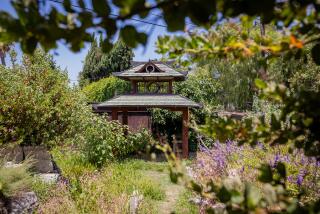LOS ALAMITOS : Dreams Old and New : Contrast: Alzheimer’s patients relive joys of their youth, while a few steps away children are just beginning their journey into life.
- Share via
In a sunny, brightly painted room with a colorful parakeet in a cage, a group of elderly people gathers to share memories of the month of August.
“I was living in Arkansas,” one woman says. “We used to go swimming, and the water was so cold. There was a creek running by our house and, when it rained, the water would run in rivulets down the hill.”
Another woman offers: “I remember turning on the sprinkler. We’d put it on full blast, run down the sidewalk and slide on our stomachs.”
They are participants in a weekly discussion group at the John Douglas French Center for Alzheimer’s Disease in Los Alamitos. Near the western end of Katella Avenue, it is the oldest of its kind in the United States, a haven where those in the autumn of their lives can enjoy the present and reflect on the past.
“Our whole approach is to make them feel some level of purpose and success,” center spokeswoman Diana Eastman says of the 146 Alzheimer’s patients who live here and the dozens more who get outpatient care.
“We try to boost their self-respect, dignity and feelings of self-worth. It’s really important for them to be part of the world.”
The French Center was founded in 1987 by diva Dorothy Kirsten to provide special care for Alzheimer’s patients. A singer with the San Francisco and New York Metropolitan operas, Kirsten was married to Dr. John Douglas French, a widely known neurosurgeon who helped found the UCLA Brain Research Institute.
In the early 1980s French was diagnosed with Alzheimer’s, a disease that attacks the brains of older people and irreversibly destroys their memory. Eventually, the disease deprives them of the ability to think, talk or care for themselves.
After caring for her husband at home, Kirsten led a campaign to build a facility for those afflicted by the disease. The owner of a vacant lot next to the Los Alamitos Medical Center donated 1.5 acres for the project: a 63,000-square-foot facility that opened 12 years ago as the nation’s first skilled-nursing center designed exclusively for Alzheimer’s patients.
French was its first resident patient and lived there until his death in 1989 at age 77. Three years later, Kirsten died of a stroke at age 82.
Today the center houses patients who live one or two to a room, matched according to their mental and physical capabilities. The cost ranges from $115 to $165 a day.
“That way they are with others whose needs are similar,” Eastman says.
For some, the needs are simple: food, shelter, companionship and recreation such as walks and an occasional scenic drive in the center’s 20-passenger van. Others participate in more complicated activities like the weekly discussion groups on topics carefully chosen to encourage sharing and to reinforce a sense of accomplishment.
Outpatient Florene Pine, 80, says she very much enjoys her time at the center. “I love it here,” she says.
“I like the freedom, and I like the people--they’re friendly, and nobody feels that they’re better than anyone else.”
John Andrew Guitai Jr., also a day patient, cannot recall his age but knows that he was born in Philadelphia and that his uncle had been a doctor.
“I think this is very good,” he says of the French Center. “You get to know other people and do lots of things.”
For Jessie Michini, 75, who spends three days a week at the center, the time “is better than being alone. I’m a plant nut, and my favorite thing is the garden walks.”
Sometimes those walks go well beyond the garden. Those who stroll around a corner and past the building find themselves close to the other end of life’s continuum: children. The French center is next door to Kidnastics, a gymnasium for toddlers as young as 20 months.
Though the Alzheimer’s patients keep to the sidewalk and are separated from the gym by a fence, they are within easy earshot of the children, 600 of whom train on the beams, bars, trampolines and rings every year.
The gym does for children what the French Center does for the elderly. “It builds their confidence and social skills,” says Velma Hoapili, an instructor at the gym. “A lot of the kids come in and are very timid and shy.”
Mary Colleary, mother of a 9-year-old gymnast, says, “They get body strength and self-esteem.”
Thus, at the western end of Katella Avenue, the past and the future exist peacefully side by side at facilities with the common aim of helping young and old achieve all they can.
Bill Gayk, director of Cal State Fullerton’s Center for Demographic Studies, puts it this way: “Along Katella,” he says, “you’re seeing the changing face of Orange County.”
More to Read
Sign up for Essential California
The most important California stories and recommendations in your inbox every morning.
You may occasionally receive promotional content from the Los Angeles Times.










